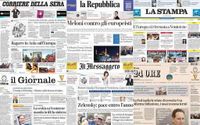On March 20, 2025, Italian newspapers prominently reported on a tense session in Parliament that was suspended following controversial remarks made by Prime Minister Giorgia Meloni concerning the Ventotene Manifesto. Meloni's emphatic declaration, "That is not my Europe," triggered a wave of discontent from opposition members, leading to fierce reactions and a temporary halt to proceedings.
In the background of this parliamentary drama, other significant events unfolded, notably the arrest of Istanbul's mayor, Ekrem Imamoglu, a prominent challenger to President Recep Tayyip Erdogan. Furthermore, reports emerged regarding the resumption of hostilities in Gaza, alongside an optimistic phone call between former President Donald Trump and Ukrainian President Volodymyr Zelensky, with Ukraine expressing hopes for a lasting peace by year-end.
The Corriere della Sera opened its coverage with a focus on the peace process in Ukraine, encapsulating the essence of the Trump-Zelensky conversation. The newspaper quoted Zelensky as saying, "Peace is possible within the year," reflecting a cautiously optimistic sentiment prevailing in Kyiv following the recent interactions with the United States. The discussions pointed toward a potential support system from the U.S., with Trump indicating plans to aid Ukraine in acquiring necessary defense systems.
Simultaneously, the publication reported on Meloni's remarks concerning Europe's foundational texts, illustrating her bold stance against what she described as "euro-fascism." The chaos in the Italian Parliament that ensued when Meloni rejected the Ventotene Manifesto's ideals demonstrated the deep ideological divide within Italian politics.
La Repubblica highlighted the gravity of Meloni's statements, noting that her comments sparked outrage among opposition leaders, with the Democratic Party labeling it as an affront to democratic values. They responded critically, underscoring how Meloni's rhetoric could alienate Italy from its European partners, with party member Elly Schlein condemning her remarks as, "an outrage." This conflict prompted a significant showdown in the Chamber, showcasing a mounting tension between the ruling party and the opposition.
On a broader scale, La Stampa commented that Meloni's rejection of the Ventotene Manifesto symbolizes a deeper crisis in EU identity, questioning the future trajectory of European integration. The unrest in Parliament hinted at wider implications for Italy's role within the European Union, especially as a Council meeting looms on the horizon.
Adding a layer of complexity to the situation, the Messaggero reported on Meloni's insistence that the Europe envisioned in the Ventotene Manifesto does not align with her vision for Italy's future. Her firm stance on this historical text evokes passionate responses from various factions, further polarizing Italian politics. Critics spoke out, including a member from the League, who argued that PM Meloni may lack the mandate necessary to challenge these foundational European principles effectively.
Concurrently, Istanbul was grappling with its own political upheaval. Mayor Ekrem Imamoglu, who has been a formidable rival of Erdogan, was detained recently, inciting widespread protests across the city against the Turkish president. Coverage of these protests revealed the palpable frustration felt among citizens toward Erdogan's government.
Moreover, the international narrative expanded with alarming reports of renewed bombings in Gaza. The situation has prompted humanitarian concerns, especially following reports that thirty-eight Palestinians were killed in recent clashes, a stark reminder of the escalating conflict in the region. The local and international response has raised questions of accountability regarding international treaties and human rights obligations.
Focusing on broader geopolitical interactions, the Giornale stressed that Trump expressed to Zelensky that they were "on the right track," suggesting a strengthening partnership between the U.S. and Ukraine amid the tumultuous political landscape. As peace negotiations unfold, there appears to be a concerted effort to maintain dialogue amidst the fighting in Ukraine and Gaza.
The Sole 24 Ore took the discussion further by analyzing economic implications of these political developments, particularly how the Fed's recent adjustments to U.S. growth forecasts could influence both domestic and international markets. The ongoing unrest not only affects immediate political relationships but could also shift economic landscapes globally.
Overall, the political climate both within Italy and in the broader international arena showcases a complex tapestry of challenges requiring deft navigation. As tensions rise, the looming question remains: how will Italy reconcile its internal divisions while maintaining pivotal relationships within Europe and addressing pressing global issues such as the Ukraine crisis and conflicts in the Middle East?


